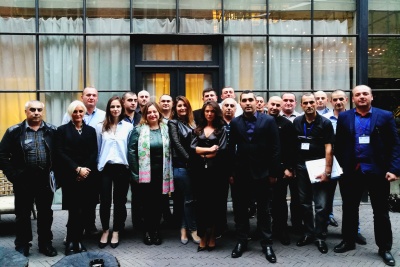Special Tasks Department to practice gender-responsive oversight across Administrative Boundary Lines
Date:
UN Women Georgia partnered with the Ministry of Internal Affairs (MIA) to enhance the capacities of the Ministry’s Special Tasks Department around gender-responsive patrolling across the Administrative Boundary Lines (ABLs).

Twenty officers stationed across the ABLs in Imereti, Samegrelo and Shida Kartli took part in a two-day training in Tbilisi. The training was dedicated to women’s rights and gender equality issues, specifically on effective ways for identifying and responding to the security concerns of women, men, girls and boys living in the villages adjacent to the ABLs. Along with the Women, Peace and Security agenda and relevant legislative and policy frameworks, special attention was paid to gender mainstreaming in security operations and communication strategies with conflict-affected women and girls.
Erika Kvapilova, UN Women Country Representative in Georgia, underlined the importance of a deep understanding and effective response to the security concerns of women and girls as a pre-requisite to building resilient communities, which is of special importance for people living close to the dividing lines.
Mr. Erik Hoeeg, Acting Head of EUMM, emphasized the importance of understanding the specific needs of conflict-affected women and girls during field operations, monitoring and reporting: “Integrating a gender perspective has made EUMM, as a Mission, operationally more effective; it has deepened our understanding of the conflict and allowed us to carry out a more insightful analysis.” Mr. Hoeeg further stressed Georgia’s leadership in the region in terms of implementing the UN Security Council resolutions on Women, Peace and Security (UNSCR 1325 et al.) and recommended integrating these issues as part of the systemic on-the-job trainings for the Special Tasks officers.
“Communities in the villages where we work are very dear to us– we share their sorrows and problems,” Kakha Akhvlediani, head of II unit of rapid response, noted at the end of the training. “The training gave us insights into the topics that we will consider while fulfilling our duties and communicating with the locals, especially with women and girls.”
Mr. Mindia Lortkipanidze, Director of the MIA Special Tasks Department, stated: “Every topic covered in this training module is extremely important for the work of Special Tasks officers. We appreciate UN Women supporting our efforts to incorporate gender perspectives in our operations.”
Providing targeted trainings on UNSCR 1325 et al. to MIA Special Tasks officers is part of the Ministry’s commitments under the National Action Plan on the Implementation of the UN Security Council Resolutions on Women, Peace and Security. Sophio Japaridze, Assistant to the Prime Minister on Human Rights and Gender Equality Issues, encouraged the MIA to integrate WPS issues in the existing regular trainings of the Special Tasks officers as a commitment under the new phase of the National Action Plan for the period from 2018 to 2020.
The training has been made possible with the financial support of the Government of Sweden within the framework of the 2017-2020 Strategic Partnership Framework between the Government of Sweden and UN Women.